Filter by
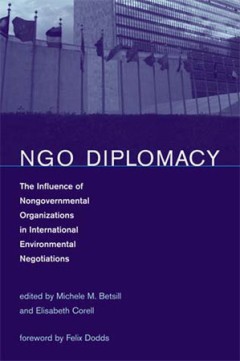
NGO diplomacy The Influence of Nongovernmental Organizations in International…
Provides an analytical framework for assessing the impact of NGOs on intergovernmental negotiations on the environment and identifying the factors that determine the degree of NGO influence, with case studies that apply the framework to negotiations on cl.
- Edition
- -
- ISBN/ISSN
- -
- Collation
- 1 online resource (xvii, 244 pages)
- Series Title
- -
- Call Number
- -

Institutional interaction in global environmental governance : synergy and co…
Annotation This systematic investigation of the interaction among international and European institutions provides both a theoretical framework for analysis and the first broad overview of this largely uncharted field of research. By offering detailed case studies and a systematic analysis of results, the book examines the effects of institutional interaction on environmental governance and exp…
- Edition
- -
- ISBN/ISSN
- 9780262280945
- Collation
- 1 online resource (xix, 405 pages) : illustrations.
- Series Title
- Global Environmental Accord: Strategies For Sustainability And Institutional Innovation
- Call Number
- -

NGO diplomacy :the influence of nongovernmental organizations in internationa…
Provides an analytical framework for assessing the impact of NGOs on intergovernmental negotiations on the environment and identifying the factors that determine the degree of NGO influence, with case studies that apply the framework to negotiations on cl.OCLC-licensed vendor bibliographic record.
- Edition
- -
- ISBN/ISSN
- 9780262268417
- Collation
- 1 online resource (xvii, 244 pages)
- Series Title
- -
- Call Number
- -
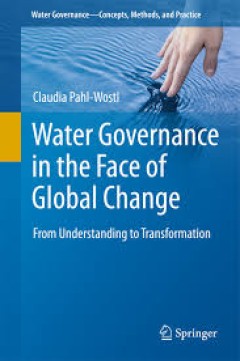
Water Governance in the Face of Global Change From Understanding to Transfor…
This book offers the first comprehensive treatment of multi-level water governance, developing a conceptual and analytical framework that captures the complexity of real water governance systems while also introducing different approaches to comparative analysis. Applications illustrate how the ostensibly conflicting goals of deriving general principles and of taking context-specific factors in…
- Edition
- -
- ISBN/ISSN
- 978-3-319-21855-7
- Collation
- -
- Series Title
- -
- Call Number
- -
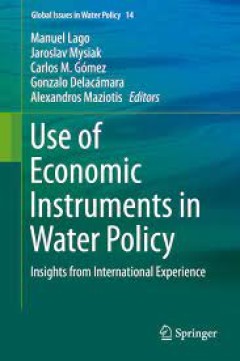
Use of Economic Instruments in Water Policy Insights from International Expe…
This book assesses both the effectiveness and efficiency of implemented Economic Policy Instruments (EPIs) in order to achieve water policy goals and identifies the preconditions under which they outperform alternative (e.g. regulatory) policy instruments and/or can complement them as part of complex policy mixes. The development of a consolidated assessment framework helps clarify (and where p…
- Edition
- -
- ISBN/ISSN
- 978-3-319-18287-2
- Collation
- -
- Series Title
- -
- Call Number
- -
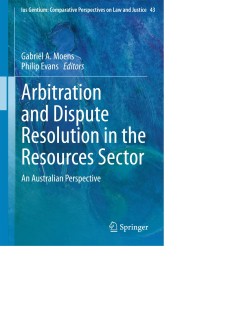
Arbitration and Dispute Resolution in the Resources Sector: An Australian Per…
This book provides a comprehensive Australian perspective on the resolution of resources disputes. In particular, it focuses on the use of arbitration, mediation and adjudication in the resources sector. It concentrates on arbitration as the preferred method of dispute resolution, including international commercial and investor-state arbitration. The book offers fascinating insights into the us…
- Edition
- Ed. 1
- ISBN/ISSN
- 978-3-319-17452-5
- Collation
- XVI, 259
- Series Title
- Ius Gentium: Comparative Perspectives on Law and Justice
- Call Number
- 346.07 ARB a
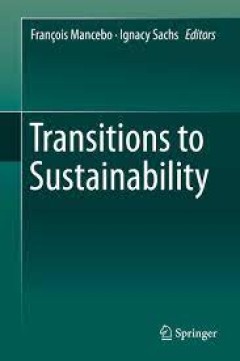
Transitions to Sustainability
This book calls for the conditions of transition to sustainability: How to take into consideration new global phenomena such as and of the dimension of climate change, the depletion of natural resources, financial crises, demographic dynamics, global urbanization, migrations and mobility, while bearing in mind short-term or local place-based issues, such as social justice or quality of life? Me…
- Edition
- -
- ISBN/ISSN
- 978-94-017-9532-6
- Collation
- -
- Series Title
- -
- Call Number
- -

Obstacles to Environmental Progress A U.S. perspective
environment;policy;biology;earth sciences;United States;obstacles to progress;environmental policy;environmental law;environmental regulation;environmental science;environmental progress;environmental solutions;environmental justice;sustainability;uncertainty;decision processes;climate change;problem solving;unintended consequences;systems perspective;environmental monitoring;freedom and enviro…
- Edition
- -
- ISBN/ISSN
- 9781800082076
- Collation
- -
- Series Title
- -
- Call Number
- -

Forests in International Law
This book investigates the potential need for an international convention on forests and establishes a multifunctional concept of forests as a cornerstone for international forest regulation. Accordingly, it examines a variety of international instruments pertaining directly or indirectly to forests and explores their entangled, fragmented nature. While contending that the lack of consistency i…
- Edition
- -
- ISBN/ISSN
- 978-3-319-14950-9
- Collation
- X, 196 hlm.
- Series Title
- -
- Call Number
- -

On the Effect of Offshore Wind Farms on the Atmosphere and Ocean Dynamics
Renewable energy resources now play an essential role in the energy supply debate, and especially a new interest in wind energy has resulted in the intensified construction of wind farms. Thanks to the growing demand for renewable energy, offshore wind farms (OWFs) are increasingly gaining in popularity, since yields over sea are greater and more reliable than over land. Against this background…
- Edition
- 1
- ISBN/ISSN
- 978-3-319-08640-8
- Collation
- XVIII, 162
- Series Title
- Hamburg Studies on Maritime Affairs
- Call Number
- -
 Computer Science, Information & General Works
Computer Science, Information & General Works  Philosophy & Psychology
Philosophy & Psychology  Religion
Religion  Social Sciences
Social Sciences  Language
Language  Pure Science
Pure Science  Applied Sciences
Applied Sciences  Art & Recreation
Art & Recreation  Literature
Literature  History & Geography
History & Geography